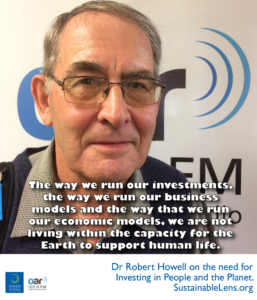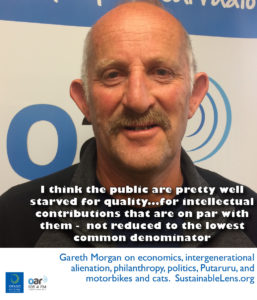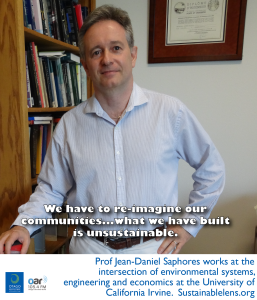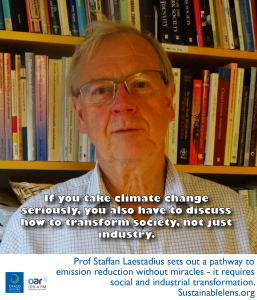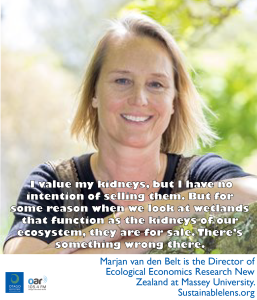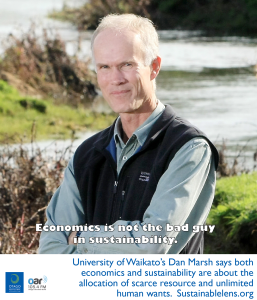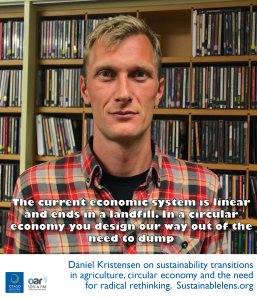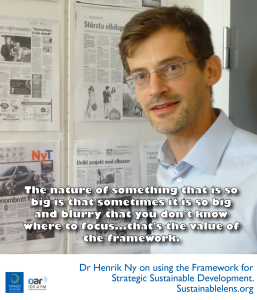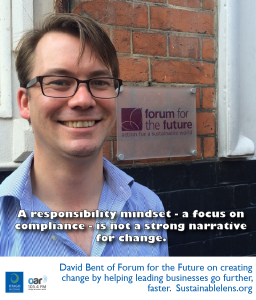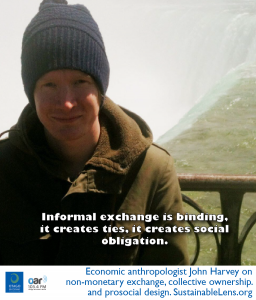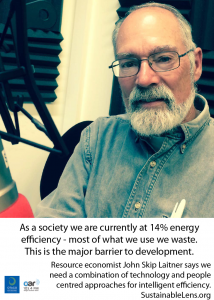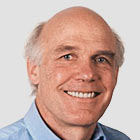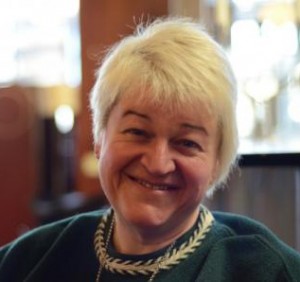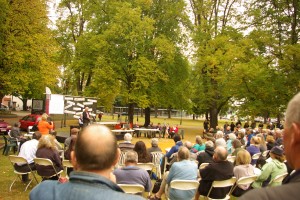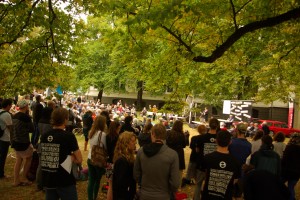The way we run our investments and the way we run our business models and the way that we run our economic models, we are not living within the capacity for the Earth to support human life.
| Samuel Mann: | Welcome to Sustainable Lens, Resilience on Radio, a weekly show on sustainability topics brought to you by Otago Polytechnic. The show is co-hosted by Shane Gallagher and me, Samuel Mann. Each week we talk with someone who is making a positive difference and applying their skills towards a sustainable future. In our conversations, we try to find out what motivates them and what it means to see the world through a sustainable perspective through their sustainable lens. Tonight’s sustainable lens is that of Dr Robert Howell whose new book, Investing in People and the Planet, is published by …
|
| Robert Howell: | It’s available through Quaker Books, so if you go to the Quaker website and you’ll be able to find it there (quaker.books@quaker.org.nz). |
| Samuel Mann: | So let’s take a few steps back. Where did you grow up?
|
| Robert Howell: | Napier.
|
| Samuel Mann: | What was it like growing up in Napier at the time?
|
| Robert Howell: | It was very interesting because … I went to Victoria University and spent ten years in Wellington then came back to Napier as city manager and when you come back as city manager, you see the city through different eyes. Did you know that the largest storm water pumps in the country are in Napier? And the reason for that is that the earthquake my parents went through – the 1931 earthquake, so that was part of my upbringing but it never did it’s job properly. It only raised the land so far and the water didn’t drain, so coming back and looking at it in different eyes was great. Looking back now, my father wasn’t rich but we were well looked after and we had a reasonably good upbringing. It was Pakeha didn’t take much to do with Maori but it was a reasonable education and some happy times.
|
| Samuel Mann: | What did you want to be when you grew up?
|
| Robert Howell: | Originally, I looked at being a minister of religion but I went to university and I guess that was part of my growing up and I didn’t become a minister of religion.
|
| Samuel Mann: | So what did you do at university?
|
| Robert Howell: | Well, I did philosophy originally. I’ve got a masters in philosophy and then I went … I had to years in broadcasting and then went the health sector and eventually I joined a small innovative unit that was headed up by management consultants to improve the efficiency of Wellington Hospital and I didn’t know nothing about management and even less about hospitals, I learned a hell of a lot.
|
| Samuel Mann: | Can I just take another step back. Why philosophy?
|
| Robert Howell: | Well it was part of the religious stuff, but when I look back now, I guess I had a skill and an innate desire to sort out the basic fundamental questions on life. I wouldn’t have put it like that, they just interested me. So that was part of the philosophy stuff.
|
| Samuel Mann: | Did you know at the time what you were going to do with it, or didn’t it matter?
|
| Robert Howell: | No, because I was growing up and searching and the thing about philosophy is that it gave you the intellectual tools to be able to examine the fundamental issues – that’s not the only discipline, of course, but it’s one of them.
|
| Samuel Mann: | So was it a shock going from answering the fundamental questions of life to improving the efficiency of the health service? That sounds quite operational.
|
| Robert Howell: | Well, I guess the searching has not stopped and I’ve always tried to be open to new initiatives and I didn’t grow up just by doing philosophy, you don’t grow up. In actual fact, when I got married – being married with my wife for about five years – she had education and sight training and she decided that to keep those alive, when our kids came along, she’d do marriage guidance training and her doing that led me to do that training and I would say part of my growing up was learning those basic skills to be able to relate to people and start talking about my feelings and talking about feelings of others, and those skills were just as important as the intellectual skills that I’d developed with philosophy.
|
| Samuel Mann: | So what have you been searching for?
|
| Robert Howell: | That’s a very good question. I guess I was wanting to … Because I was brought up in an evangelical religious framework. Christians like “is there a god and if there is, what is a god?” I decided that the personal, so-called ‘being’ that manipulates the world from outside and that’s part of a method of storytelling. It’s relevant for some people but not for me, and then I guess I wanted to just start learning about some of the ways in which the world worked.
|
| Samuel Mann: | And if there is a God, what’s he playing at with all the wars and climate change?
|
| Robert Howell: | Well. I don’t use the term ‘God’ now.
|
| Samuel Mann: | Okay.
|
| Robert Howell: | My wife was a Quaker and over thirty years, osmosis took place and Quakers – or one of the attractions of Quakers is that they don’t have a creedal affirmation. They have a lot of emphasis on personal experience. The Maori word for the Quakers of New Zealand ‘te HÄhi TÅ«hauwiri’ which means the group that stands shaking, blown around, buffeted by the wind of the spirit and I prefer to talk about spirit, rather than god because the term god has been so badly abused. When George Bush says that God led him to go into the Middle East, then I don’t want to use that term. So I talk about a spirit in terms of certain sorts of experiences that have profound impact on one, in terms of thinking about the purpose of life, the mysteries of life, the beauty of life and those sorts of experiences – when you feel one with the world. Doesn’t happen all the time of course.
|
| Samuel Mann: | How do you mix that with doing the job, whatever it is? Eventually you found yourself back in Napier, running the city. Is it always in your head, is it something you do at home? What’s the relationship there?
|
| Robert Howell: | Can I just go back to the hospital? I saw that my role in the hospital was to help to work at a practical level, helping people, use taxpayer resources more efficiently. I saw that if I could get a better buck for the way in which the system was run, then that was a good contribution to society. So I was brought in initially in Napier by a reforming mayor to improve it, and we did. So I was seeing my work and during that I developed skills and had training and my PhD was really in how do you measure the community’s health for planning purposes? Which led me to use my philosophical skills to say “what is health?”
|
| I rejected the medical model, so I developed a different kind of model for health for those purposes. So it was using the philosophical skills but then embedding it with a more strategic planning framework and I guess I brought, to my work, as a change-agent, as a CEO, as a consultant, as a university teacher, I brought a strategic perspective. So the strategies, strategic processes and how we design and run our organisation. So that’s what I developed.
|
|
| Samuel Mann: | Did you do your PhD while you were working?
|
| Robert Howell: | I was able to … the Hospital Board gave me one day a week – while I was working – to work on the PhD and I did that for two years. I basically read and then I got a medical research council grant to go to the States for two and a half months, and Britain for two months – that was full time – and then I came back in the light of all that experience and did all the fieldwork and wrote up and that was on a medical research council grant.
|
| How I got into the council was that there was no immediate niche for me to get back into the health area – and I was home in Napier – and a new mayor had been elected and he didn’t want a town clerk, he wanted a city manager and he wanted somebody who could reform the council and that was part of my task – very difficult, the council was very divided but we managed to make some significant changes.
|
|
| Samuel Mann: | I’m just looking through your CV over the following ten years and there’s a whole pile of stuff in there. You’ve certainly kept yourself busy and working a whole lot of different areas.
|
| Robert Howell: | Yes, at times it became very awkward. In part, my wife was what I would call a social entrepreneur. So she developed a language school in Napier. She was one of the early pioneers in that area – brought Japanese students – and I met some Japanese people and when I left the council, I developed an agricultural College. College is a bit grandiose. It was really a cross between a community high school and a college, but it brought … We had one-year courses, amongst others and brought Japanese students out, gave them three months English training and then put them on farms – dairy farms – beef and sheep, horticulture and so on – practical experience stuff and then, at the same time, I started links with Massey University and they wanted me to run a course in local government and I linked up with Massey people and we did a lot of reviews of that local government process five years down the track.
|
| One of the research projects I did was to look at the way in which governance had been changed because part of the problem of running local authorities is that I was in charge of … I forget how many staff we had now … About a thousand or something like that, a budget of about fifty million. The majority of the Councillors were in businesses that had no more than two or three staff, so the processes of organising a large operation were quite difficult for them and they wanted to get hands-on and really, the whole question of the role a council or a board and its relationship with the stakeholders was the subject of a study that I did, to see whether the reforms in the eighties had made difference … Shorter answer – they hadn’t – but during that process, I did a identified a model by Carver, an American researcher and then I used that subsequently to teach and consult that whole governance area.
|
|
| Samuel Mann: | When you’re working in the council, or in fact, any organisation, any business that’s operating at that kind of scale – in the tens of millions of dollars – is it possible to apply those principles that we touched on before the beauty of life and the peacemaking and all that sort of stuff? Does it work in that kind of organisation?
|
| Robert Howell: | When I first went to the council, I used more of my marriage guidance stuff because the council was divided, so it involved a lot of listening and then putting in the systems to be able to make the organisation more efficient and I think that … I mean, I see strategy and organisational design, if it’s done properly, is good problem solving. What you’re doing is avoiding the fisticuffs conflicts and you’re providing a method of resolving those issues in a nonviolent kind of way. So strategy, for me, is part of a nonviolent process if you like.
|
| Samuel Mann: | Eventually you found yourself in Auckland doing various governance things and is it about that time you started getting interested in responsible investment?
|
| Robert Howell: | What happened was that I wanted to get a consulting job with some Anglican trusts about governance, okay? And their basic job was investing, it was a bit of a mess, there were a lot of them. I never got the job, but then I got invited to be the Quaker representative on the CCANZ – the equivalent of the National National Council of Churches. So I persuaded them to set up a committee to look at church investments as a good background for me to do more consulting on this – a selfish as well as an altruistic motive and eventually, that morphed into looking at investment in not just a religious way, but a more fundamental way for everybody and I set up the Council for Socially Responsible Investment that was open to everybody, and if I could take you down where that led me, was that I then began to say “what are the kind of measures that one should look for, to know that a company is being responsible to the environment, as well as to humans – human Earth as well as the human-human relationship?
|
| To cut a long story short, that took me to two think tanks. One was a Quaker institute for the future, which was set up in North America by the Quakers and the other one was sustainable Aotearoa New Zealand – based in New Zealand, of course. The beauty of those is that they were multi-disciplinary. There were scientist, economists, lawyers – a real mix of people and I learnt a hell of a lot from those groups. The first one was the state of the Earth for sustaining human life is pretty fragile, very fragile, far more than I ever had appreciated. Secondly, a significant reason why that is the case is because of our economic models and our financial models and the third thing was that that’s related to our ethics, and that was what really interested me in going back to my original philosophy. So I went back and did some philosophical stuff. I started reading stuff that I had sort of touched on about forty years ago, but then read quite widely in that area and what I was able to do was bring a public policy perspective as well as an integrating perspective.
|
|
| So it’s part of trying to get a handle on all of this. It was a very fertile time for me. I’ve done a – what I call – a ‘wiring diagram‘ (see article). It’s on a one page and on the left-hand top are the three or four ethical positions like Aristotle, utilitarianism, the social contract and mapped it out, how over – in Aristotle’s time – over centuries, how they have moved from just being concerned about human-human relationships to include a human-Earth relationship. So all the significant philosophers today, have extended those traditions to deal with those issues.
|
|
| So that was at the top. In the middle was all the economic models and how they have changed and at the bottom was the science and the major scientific discoveries and then I had little dots, related to major changes that had occurred and I found that was my way of making sense – now, I’ve given that as a lecture for over fifty-plus times and people have found it very helpful. So what I was able to do was provide an overview, an integrating perspective, to look at how the science and the economics and the ethical stuff had change in significant ways, but there were gaps, you see? The economic model that we have today is still based on crude utilitarianism and they haven’t made the changes.
|
|
| The other thing that it helped me to do was really, then start to think, “well, what does this have for investment” and then that took me back to the journey that this book is about because this book is … Even though I wrote it in a month and sort of corrected it in about two months, with sending it out and proofreading and all that stuff that you’ll know about … It’s really a summation of what I’ve learnt over the last ten to fifteen years and how about ninety percent of the world’s investments are unethical.
|
|
| I made some surprising discoveries. Did you know, for example, that while the New Zealand government was taking on the French government and the American government and the world generally, over three decades, about nuclear weapons, during all that time government investments were invested in the nuclear weapons industry?
|
|
| Samuel Mann: | No.
|
| Robert Howell: | No, a lot of people don’t. So part of what I’m on about is saying to people there is a connexion between the way you invest and your values and so what I’ve tried to do is make that connexion and to say it’s really important as individuals that we make that connexion and here are the tools to be able to put your values into practise as a taxpayer and as an individual investor. How do you select the KiwiSaver fund that is consistent with your values? How do you sort out which fund – managed fund or insurance company, or bank – how do you sort out whether they are actually caring for people on the planet? How do you get through all the PR hype in simple terms and start to use the power that you, as an individual have, to be able to make those changes? That’s what the book’s about.
|
| Samuel Mann: | You’ve said ninety percent of the world’s investments are unethical …
|
| Robert Howell: | Managed funds and sovereign wealth funds.
|
| Samuel Mann: | … Does unethical there, mean can operate without consideration of ethics or does it mean, somehow bad? Or is bad by definition if you’re not thinking about it?
|
| Robert Howell: | If you go through my Wiring diagram, that gives you all the sophisticated discussion, but at the very bottom line, for me personally, what it means is one needs to develop a principle for dealing with people – a human-human ethic, and then you need to deal with the human-Earth ethic. So for me, the human-human ethic is based on fairness. That’s the term that I would use. Other people use similar sorts of terms that have got similar sorts of mileage but just in simple terms, that’s the core concept.
|
| In terms of human-Earth, I would say rather then exploitation – exploiting the Earth for human utility – one should respect the Earth. There are other terms -Â Schweitzer used reverence for life, there are lots of other terms, but for me, respect. So IÂ want to then say of the companies that the New Zealand superannuation fund invests in and ACC and the KiwiSaver funds and my bank and my insurance company, the universities, the councils, do they meet those principles? Are they based on fairness? Do they actually abuse people in a fundamental kind of way – and I’ll give you an example with Nucor in just a moment – and do they actually respect the Earth, so that humans can live within the capacity of the Earth to support human life.
|
|
| Now, at the moment, the way we run our investments and the way we run our business models and the way that we run our economic models, we are not living within the capacity for the Earth to support human life. Those are the two fundamental principles and I then have a series of more detailed questions that enable one to tease out whether that’s the case.
|
|
| Just to give you an example of Nucor. Â Nucor is the largest steel company in the United States. A number of years ago, it got pig iron from Brazil. That pig iron was produced using charcoal that came from the forests of Brazil from slave labour. A group of people in the United States, including – but there are others – the interface centre for court and responsibility, which is a grouping of Protestant and Catholic and Jewish investors with about a hundred billion under investment. They are the world’s best shareholder activists. So they ring along to Nucor and its management and its AGM and they put resolutions to say to Nucor they would adopt as policy, not to buy any pig iron from Brazil that was produced with slave labour and they also wanted Nucor to fund two groups in Brazil to independently verify that Nucor was doing what it promised to do. Now that took three years of negotiations.
|
|
| So, here is a company Nucor that is using slave labour for steel. It doesn’t meet the human-human perspective. It’s not fair. So that’s one example. Plenty of examples in the human-Earth relationship. All the big Australian banks are invested in coal – fossil fuels. If we don’t get out of coal, if the world doesn’t quickly get out of the use of coal, we are into a two degrees Celsius plus warming. Now that’s got major implications and that’s likely to happen at the moment. That’s likely to happen the decade 2030 – starting 2030. It’s less than fifteen years away. So from a New Zealand point of view, a two degree warming … We have just had, recently, fires in Christchurch. In Auckland we’ve had heavy downpours which have caused quite considerable infrastructural damage. In the North of Auckland we’ve had a nine month drought, okay?
|
|
| You get a two degrees Celsius warming, you’re going to have more droughts, more floods, more heavy rainfall and you’re going to have it more often. That’s going to have a major impact on New Zealanders, it’s going to have a major impact on our economies. Now, that’s just New Zealand, you need to look at what’s the impact in terms of Australia and some of our major partners we sell our milk and various other things to. It’s going to have a major effect on China.
|
|
| So there are a number of companies that are simply not preparing us to be able to deal with this sort of scenario. So there’s an example of how you can apply the principles, in terms of human-Earth and human-human.
|
|
| Samuel Mann: | One of my favourite definitions of sustainability is ethics, expanded in space and time, and what I do in some of my teaching is expand on the trolley problem – the train racing down the track and it’s going to kill three people but you can save them but it’s still going to kill one and you can do students’ heads in quite quickly about getting them to the edge of utilitarian ethics, what happens when one of them is you grandmother, that kind of thing. My question is, well if you had a third alternative and you could divert it into a forest, what would you do? And if it’s just an empty forest, then the forest. But what if it’s got the last two remaining orangutan in it? You’ve got a much deeper understanding of this than me.
|
| Robert Howell: | These are lifeboat choices, aren’t they? Look, when you’re in the middle of a war, it’s really difficult for these choices and so what I would prefer to do is to slow the train down in the first place, okay? This is the strategic perspective that I bring and let me quote you an example of Shell – not my favourite company, but in late 1960s/70s they set up a strategic planning unit.
|
| Now, at that time, Shell was saying that strategically we look at the oil that was supplied last year and sold and we had two percent and you had a gradual rise in the graph over a decade or so. The Strategic planning unit was asked to look at some of the strategic options and they said “well, instead of two percent, what if it’s twenty percent, what would we do as a company if all of a sudden the oil increased by twenty percent?” And then they started to say “well, these are the things that we could do.” Then the Arabs came along and did exactly that and Shell was very well placed because they’d done the thinking beforehand to be able to deal with how to respond to that.
|
|
| Except, the shipbuilding sections – the tanker section of Shell – they didn’t want anything to do with this strategic planning stuff, right? And so when the Arabs increased the price of oil, they kept building ships until they had so many ships that they didn’t know what to do with them. They keep falling over them etc. Then they realised that in fact, the strategic stuff was actually relevant. So what I want to say is there are certain things that I can’t do. I think the time for averting significant climate warming … The easy options are gone.
|
|
| I just think we are faced with some very difficult places and people will die and ecologies will die, animals will die. Nothing I can do about that but what I can do is start to encourage fellow colleagues – people like yourselves and people listening to this radio to say “let’s start preparing options for how we’re going to deal with adapting to these situations” and one of the advantages of the Shell analogy is that once you’ve done that, you can actually read the signs. The Shell people in the tanker division weren’t reading the signs and there are people in New Zealand, including our government, who bemoan the fact that another hundred year flood as arrived since the last five years and another one’s going to come and they’re not reading the signs. How many fires do you need, how many droughts do you need?
|
|
| Well, if you start thinking about the scenarios and the signs we’re talking about, then you do read the signs and then you’re in a much better position to start preparing options. Some of those options are going to be very difficult. Can I give you another train analogy?
|
|
| Samuel Mann: | Mm-hmm (affirmative).
|
| Robert Howell: | I’m very critical of the SRI industry – social responsible industry – because I think that they have been captured by a model that’s not valid and that’s the United Nation’s principles that are responsible investment, it’s not a valid definition. A whole variety of reasons I can give for this but I’ll leave those to one side, you can come back to me if you want to. Now, what that means is that the New Zealand Superfund claims in its annual report “we are a responsible investment because we’ve signed up to the UNPRI,” but they’re invested in Exxon Mobil and they’re invested in Rio Tinto and a whole series of other companies that are really notorious for the way they treat people and the way they treat the planet and so the UNPRI is seeming to do something, it’s what I would say walking southward on a northbound train. It gives you the impression that you’re going in one direction when you’re actually going in another direction. That’s my other train story.
|
| Samuel Mann: | Okay, I’m going to add another one then and – to further extend the space and time thing – if we could have an alternative track where we put the train onto some sort of space time loop, that it disappears for ten years, but then it’s going to come back in ten years and instead of two or three people, it’s going to kill off some large number – a thousand people, what would you do? And it really does my head in to think that I’m the person that’s supposed to know this stuff and my gut reaction is to go for that one. Why are we so bad at the ethics of the future?
|
| Robert Howell: | If you’ve got two hours with me to go through the psychology of decision-making, I might answer that. Let me give you a couple of suggestions. I think that if you’re a young family with kids, you’re worried about where you’re going to live, how you’re going to pay for your house, how you’re going to get a job that’s going to give you enough, etc., you get focused on the immediate short-term. It’s very difficult to start making significant changes out of that.
|
| So you get bound up into the business-as-usual model. So that’s one thing. The second thing is that if you want to move away from the business-as-usual model in the company … I mean, I’ve bought an electric car, I’m getting solar panels in the house, getting more water tanks – because we’ve just shifted where we are in Auckland – but there are certain things that I … If I really wanted to be purely sustainable, I’d find it very difficult because how do I look after somebody who’s sick, who needs an ambulance? The ambulance at the moment uses petrol, so what do I do? Do I deny using an ambulance to take somebody to hospital because it’s using petrol? So, you’re faced with really difficult choices.
|
|
| So what you do … I like the analogy of the good Samaritan. The good Samaritan came along and saw somebody lying in the gutter. The good Samaritan was a Jew, the guy lying in the gutter was not. He helped him. Bound up his wounds and took him in. Didn’t bother to save the world, he just wanted to help that guy. So my suggestion, my focus is, where you have the opportunities to help people in small little ways, do it. Because if everybody did that, then the world would change and that’s why I come back to investments. People say “oh, its too hard, I don’t understand finance” etc. But in my book I try and spell out in very simple terms, what we, in very simple ways, can do to use our little money to actually start making some changes and when you do that for others it’s very powerful. Not sure whether answers your question, does it compare?
|
|
| Samuel Mann: | I think so. What it leads me to is a question of can you live ethically, when, as you’ve just described, we almost can’t live sustainably?
|
| Robert Howell: | Well the short answer is no. The society that we live in at the moment – the food we eat for example, if we’re really honest with ourselves, is the food sustainable? Do we get tomatoes from Italy? If you’re going to the supermarket and then go through as much as you can – because the labeling’s pretty terrible – ‘made in New Zealand from New Zealand and imported stuff’, but if you really did an accurate assessment of our food and how sustainable it was, it wouldn’t be. Well, one of the alternatives is to actually grow your own food, but if you’re a mum with three or four kids, there is some food that you can grow – you can grow your herbs and get a little garden going, but it’s sometimes quite difficult to be completely organic and … You can pay a bit more for organic food, but your choices are limited. So you do what you can and you try and persuade … So, that’s why I say go and start using your money because that’s a way of helping people to make the changes.
|
| Samuel Mann: | So if it’s so very difficult for us to live sustainably and ethically, is there a pathway to a positive future?
|
| Robert Howell: | Erm, I think that we all make mistakes. Aristotle talks about ethics in the terms of being an apprentice – which I like – that is that you have to learn how to be good and it takes a while and there are some things that you need to learn at seventy that you can’t learn when you’re twenty. So it’s an ongoing process and there’s some very difficult choices on the way that don’t make it easy. My wife died from cancer two years ago. I thought that I knew how to handle grief because I’d been trained as a marriage guidance counsellor, you see? But I didn’t. So that was a really difficult learning time for me, okay?
|
| The year she died, there were some good times but there were pretty difficult times, but the year after, trying to learn to live with her – my close intimate partner for forty-five years … rat-shit year. Terrible. And it really posed, for me, some very difficult, personal, moral questions about should I have a new partner? When? How? My family didn’t want that. A number of people said “don’t do it Robert, don’t do it,” yet losing that companionship was just terrible. So how did I prepare myself for that? Well, I thought I had but I hadn’t. So life throws at you stuff that you don’t know, okay? So, you’re going to make mistakes, that’s life. What you have to do is try and be as resilient and capable. Use the strengths as you can.
|
|
| Samuel Mann: | Do you have a word that you use to describe what we need to be doing? Do you use ‘sustainable’, do you just use ‘resilient’?
|
| Robert Howell: | I think ‘sustainability’ has lost it’s credibility like ‘God’. It’s become a PR term – sustainable companies. Well I want to know what they’re actually doing. I want to know what their ecological footprint is. I want to know what their policies are in terms of human-Earth ethics. I want to know what they’re doing by way of planning for a world that’s going to have two degrees plus Celsius warming. Those are my three questions of the companies. When I go to annual reports and when I talk with banks and so forth, my questions are where are your policies dealing with the human-human, human-Earth relationships and the policies and your codes and conduct, so forth. Secondly, where’s you ecological footprint? Are you actually measuring that? It’s not just CO2 or CO2 equivalent, it’s water use and effect on species and so on. And thirdly, what are you doing to prepare for a two degrees celsius plus warming world? Sustainability and resilience are part of those questions and those stories.
|
| Samuel Mann: | We’re writing a book of these conversations, we’re calling it ‘Tomorrow’s Heroes’, how would you describe you superpower? What are you bringing to the good fight?
|
| Robert Howell: | I’m not sure I like the term ‘a hero’, okay? What I would want to say is that if people can learn from the journey that I had, then I’m happy to talk about it. I think that the experiences and the stories and the learnings that I’ve had are not well-known. Not many people know about the government investing in nuclear weapons industries while they were opposing the French and the Americans. So I’m wanting to make those stories known. I’m wanting to alert the people in public office and organising organisations – both public and private – that the world is really facing some very, very serious challenges.
|
| The thing that I brought to the think tanks – which composed of scientists and economists and so forth – was a public policy perspective and an ethical perspective. I asked questions like “what are your values and how do you integrate that into the dialogue?” So that’s what I bring. The knowledge of fifteen or so years of strategic perspective, talking about that journey. If that’s of value to people then I’d be happy to be known for that.
|
|
| Samuel Mann: | Okay, I’ve got four more questions and four more minutes, so minute per question. Do you consider yourself to be an activist?
|
| Robert Howell: | Yes.
|
| Samuel Mann: | You talk about shareholder activists, is that the …
|
| Robert Howell: | That’s part of it, yeah.
|
| Samuel Mann: | What’s the activist role you have?
|
| Robert Howell: | Ah, well at the moment, I’m working with 350.org, amongst other organisations and I’ve been in dialogue with the Auckland council about its investments. I’ve taken them to the ombudsman and I’m providing examples and strategies and things to 350.
|
| Samuel Mann: | Have you always been an activist?
|
| Robert Howell: | No, because when I go back to the start of my career, what I felt is that I could best contribute to society if I worked within organisations to help them be more strategic and efficient, getting better value for money – if you got better value for money then that was a major contribution to society. So I’ve tried to do a lot of working with people. One story I haven’t told you about is that in the nineties I initiated a project to work with the Indonesian police bringing nonviolent training to the police in Indonesia and that was working with the New Zealand government to get funding and working with a group in Yogyakarta. So I was working within the system. But I’ve got to the stage now where I think a more public activist advocacy role is necessary.
|
| Samuel Mann: | Okay, we’re now down to thirty seconds per question. What motivates you? What gets you out of bed in the morning?
|
| Robert Howell: | There are times when I get pissed off and angry. At times I want to finish on … There’s a bit of stubbornness about me. I don’t like people getting away with hypocrisy and stuff and also I’ve got three grandchildren.
|
| Samuel Mann: | If you could wave a magic wand and have a miracle occur, what would you like to have happen?
|
| Robert Howell: | That’s a difficult one. Well, I really would like the government to face up to these issues of climate warming and the fact that our economic model is bust, and start doing a proper dialogue and regulating. I called New Zealand government in New Zealand the Volkswagon of the Pacific because they’re cheating. I’d like them to be honest and engage with not just the money people of New Zealand, but everybody.
|
| Samuel Mann: | Lastly, do you have any advice for our listeners?
|
| Robert Howell: | Read my book to be enabled to ask the right questions about which bank you choose, which kiwisaver fund you want, where you want to put your money and join with others to be able to make those changes.
|
| Samuel Mann: | Thank you very much.
|
